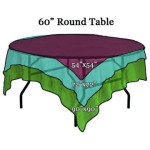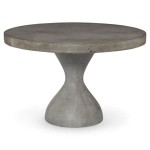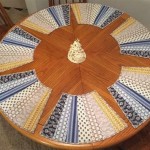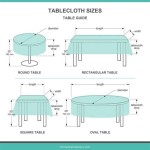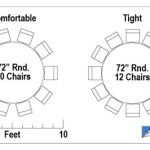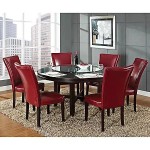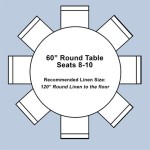The Beauty And Versatility Of Pedestal Table Rounds
Pedestal table rounds, characterized by their single, central support base, represent a timeless design that transcends stylistic boundaries. Their popularity stems from a combination of aesthetic appeal, functional benefits, and adaptability to various interior design schemes. In the context of Japanese interior design, where principles of minimalism, harmony, and natural materials hold significant weight, pedestal table rounds offer particularly compelling advantages. This article will explore the beauty and versatility of these tables, highlighting key aspects that make them a fitting choice for diverse settings.
The foundational principle behind pedestal table rounds lies in their space-saving design. The single base eliminates the need for legs at each corner, as found in traditional four-legged tables. This configuration frees up legroom and allows for more seating options around the table's perimeter. In smaller spaces, a pedestal table round can maximize usable area while maintaining functionality. Furthermore, the circular tabletop promotes conversation and interaction, fostering a sense of community and shared experience. This characteristic is significant in both residential and commercial settings, enabling comfortable dining and collaborative work environments.
Beyond their practical advantages, pedestal table rounds contribute to visual harmony and balance within a room. The smooth, continuous line of the circular tabletop contrasts with the often-angular shapes of other furniture pieces, creating a sense of visual softness and fluidity. The pedestal base further enhances this effect by providing a stable and grounded foundation that does not detract from the overall aesthetic. This design element allows the table to blend seamlessly into a variety of design styles, from classic to contemporary.
Space Optimization and Enhanced Flow
A primary advantage of pedestal table rounds is their ability to optimize space. In smaller apartments or dining areas, traditional tables with four legs can create a cluttered and restrictive feel. The legs often obstruct chairs and restrict movement around the table. Pedestal tables, in contrast, offer unobstructed legroom, allowing occupants to move freely and sit comfortably. This creates a more open and inviting atmosphere, particularly beneficial in spaces where maximizing perceived square footage is crucial.
The absence of corner legs also simplifies cleaning around the table. With a standard four-legged table, navigating around the legs with a vacuum cleaner or mop can be cumbersome. The unobstructed space beneath a pedestal table makes cleaning easier and more efficient, contributing to a cleaner and more hygienic environment. This seemingly minor detail can significantly impact the overall maintenance requirements of a space, especially in high-traffic areas.
Furthermore, the circular shape of the tabletop promotes a more natural flow of movement around the table. Individuals can easily navigate around the perimeter without bumping into corners, enhancing the overall sense of spaciousness and freedom within the room. This is particularly important in smaller spaces where every inch counts, as it contributes to a more comfortable and functional living environment.
Material Versatility and Aesthetic Adaptability
Pedestal table rounds are available in a wide range of materials, each offering a unique aesthetic and functional profile. Wood, particularly hardwoods like oak, maple, and walnut, is a popular choice for its warmth, durability, and natural beauty. Wooden pedestal tables can be stained or finished to complement a variety of interior design styles, from rustic to modern. The inherent grain patterns and textures of wood add character and visual interest to the table, creating a focal point within the room.
Metal, such as steel or wrought iron, provides a more contemporary and industrial aesthetic. Metal pedestal tables are often sleek and minimalist in design, making them suitable for modern apartments or commercial spaces. Metal can also be powder-coated in a variety of colors, allowing for customization and integration with existing color schemes. In addition to their aesthetic appeal, metal tables are highly durable and resistant to wear and tear, making them a practical choice for high-traffic areas.
Glass tabletops, often paired with metal or wooden pedestal bases, offer a light and airy aesthetic. Glass allows light to pass through, creating a sense of openness and transparency. This is particularly beneficial in smaller spaces where maximizing natural light is essential. Glass tabletops are also easy to clean and maintain, making them a practical choice for dining areas or workspaces. The combination of glass and metal can create a sophisticated and modern look, while glass paired with wood can offer a more natural and organic feel.
Stone, such as marble or granite, provides a luxurious and elegant aesthetic. Stone pedestal tables are often statement pieces, adding a touch of sophistication and grandeur to any room. Marble, in particular, is known for its unique veining and patterns, making each table a one-of-a-kind creation. Stone tables are highly durable and resistant to heat and scratches, making them a practical choice for heavy use. However, they can also be quite heavy, requiring careful consideration of floor support and installation.
Integration with Japanese Design Principles
Japanese interior design emphasizes principles such as minimalism, natural materials, and connection to nature. Pedestal table rounds align well with these principles, offering a functional and aesthetically pleasing addition to Japanese-inspired spaces. The clean lines and simple form of the table complement the minimalist aesthetic, while the use of natural materials, such as wood or bamboo, reinforces the connection to nature.
The circular shape of the tabletop also resonates with the Japanese concept of "ensō," a hand-drawn circle that symbolizes enlightenment, elegance, and the universe. The ensō represents the beauty of imperfection and the freedom of expression, values that are central to Japanese aesthetics. The circular table can serve as a visual reminder of these principles, creating a sense of harmony and balance within the room.
Furthermore, the emphasis on natural light in Japanese design is enhanced by the open space beneath the pedestal table. The absence of corner legs allows light to flow freely, creating a brighter and more inviting atmosphere. This is particularly important in Japanese homes, where natural light is often used to create a sense of tranquility and connection to the outdoors. The pedestal table, therefore, contributes to the overall sense of serenity and harmony that is characteristic of Japanese interior design.
The adaptability of pedestal table rounds allows them to be incorporated into various Japanese design styles. In a traditional Japanese room, a low pedestal table made of wood can serve as a focal point for tea ceremonies or meditation. In a more modern Japanese-inspired space, a sleek metal pedestal table with a glass tabletop can provide a contemporary touch. The versatility of the design allows it to be adapted to suit individual preferences and the specific requirements of the space.
In conclusion, pedestal table rounds are not merely functional furniture pieces but also aesthetic elements that can enhance the beauty and versatility of any space. Their space-saving design, material adaptability, and compatibility with diverse interior design styles, including Japanese design principles, make them a valuable addition to both residential and commercial environments. The inherent benefits of this design contribute to a more comfortable, functional, and visually appealing space, promoting interaction and creating an environment of harmony and balance.

Michi Japanese Solid Wood Round Dining Table Dill And Johan

Michi Japanese Solid Wood Round Dining Table Dill And Johan

Michi Japanese Solid Wood Round Dining Table Dill And Johan

Michi Japanese Solid Wood Round Dining Table Dill And Johan

Michi Japanese Solid Wood Round Dining Table Dill And Johan

Chic Japandi Dining Table Ideas For Your Home Mojo Boutique

Sol Round Wood Dining Table World Market

Round Dining Table Handmade In Solid Walnut Cherry Mahogany Or Oak Wood Mid Century Modern Pedestal Base

Michi Japanese Solid Wood Round Dining Table Dill And Johan

Amon 120cm Pedestal Round Dining Table
Related Posts

